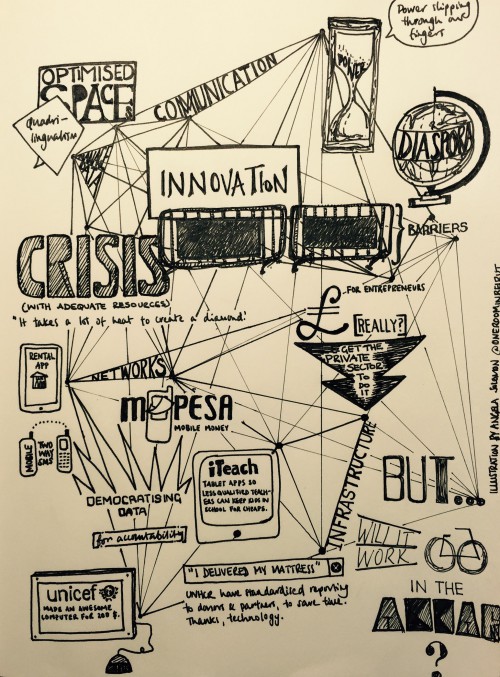18th February 2015 Beirut, Lebanon
New Technology for Old Challenges: Innovation and Development
The Syria conflict has created the biggest refugee crisis in modern history – imagine everyone inside the M25 leaving Britain. Lebanon is dealing with an unprecedented influx of those vulnerable refugees, 78% of them women and children.
The international community’s response has been huge – we are spending more in Lebanon per square kilometre than anywhere in the world. UK funding for Lebanon in the past two years is greater than the total for the rest of post independence history. Yet we and our Lebanese partners are still struggling to cope. One response is to raise more funds, as we will be trying to do in Kuwait in April. One is to get education to those who need it. Another, we have discovered, is to innovate.
There are some great examples already out there. Ten years ago, DFID seed funding enabled Vodafone to pilot transferring credit via text message for farmers in Kenya (M-Pesa) – a technology which is now global. DFID is promoting the provision of ATM cards loaded with cash, to empower vulnerable people to spend on their most urgent needs: whether it is food, shelter or fuel. It is also great value for money and provides a cash injection into the local economy. UNICEF has developed a low-cost tablet ($100) called Raspberry Pi, invented in the UK. It is loaded with apps and games to help kids improve their maths, science and technology skills and is now being rolled out to schools across Lebanon. UNHCR use Google Earth to capture real time data on health, education and water across the country and with one mouse click can zoom in on any village and pull up the vital stats they need to direct the right resources to the right people.
Mark Lowcock, DFID’s Permanent Secretary and an innovation champion was here this week, and we spent two hours brainstorming with development experts and entrepreneurs on how we can change the way we do development. Angela Solomon’s mind map below captures some of our conclusions. We need to matchmake public and private solutions, and get entrepreneurs to own the challenges. We need some talismanic role models to show the way. We need to be connectors not castles – solutions will come through empowering new participants, especially refugees and communities. We need to remain focused on what delivers – ‘Does it work in Akkar?’
The hardware matters: broadband, kit, connectivity. But we also showed that spreading the English language fosters innovation and makes people less poor. We are only on the cusp of understanding the massive potential of Big Data . We need to seek out the best examples from other fields – robotics, classroom tech, start ups. As so often, the best role for embassies is to convene, connect and then stand back.
Most importantly, innovation in development will work best where it creates wider win/wins, not least economic growth. We have to find ways to ensure that the refugee crisis is not just a drain on the Lebanese economy, but triggers new ways of building Lebanon 2020. One way we want to encourage this is through the UK/Lebanon Tech Hub. Most importantly, we need Lebanese and Syrian thinkers to identify new ways to get help to those who most need it, give Syrians the skills to rebuild their country when they are able to return in the future, and stimulate growth here in Lebanon. This involves a change of mindset from a situation where refugees are seen only as helpless victims, and donors as detached. It means a genuinely collaborative, fresh approach, drawing in anyone who can be part of the solution. As a UN colleague says, ‘It takes a lot of heat to make a diamond’.
The politics are not easy, but as long as Syrians are caught between the Assad’s barrel bombs and the barbarism of ISIL, we do not have the luxury of hoping this crisis will simply go away. If Bill Gates believes innovation can work, so should we. We need to bring the newest technology and the smartest minds to the oldest of challenges, and this is the right place to start: creativity is in Lebanese DNA.

In DFID Kenya I’ve seen a programme that uses biometrics to do away with ration cards in refugee camps, saving an awful lot of potentially wasted or surplus rations being distributed.
Other work I’ve seen has involved using mobile phone locations to map mass migrations, predicting where and when the next group of refugees will turn up.
The innovations are out there, we just need to get better at sharing what works.
What you’re saying is something most Lebanese people have had in their mind for a long time now. The brainstorming the possible solutions and whatnot. We know that the sky is the limit but right now the thing we are missing the most is the mechanism. We have the mindset, we have the knowledge but we do not have the support we need. If I personally or on a university or city scale could be of any assistance, I’d be more than willing.
For a start I believe there are many people of (but not only) the Levant diaspora who would provide help in the form of food, clothing and small items. Perhaps the airlines of the region could support this by enabling their spare cargo capacity. You’d need some volunteer collection system at their outstations in Europe, Gulf & elsewhere. All this can be supported by a digital platform.
Videoconferencing systems could also enable multiplying classes with virtual teachers to reach more pupils, if that’s a need.